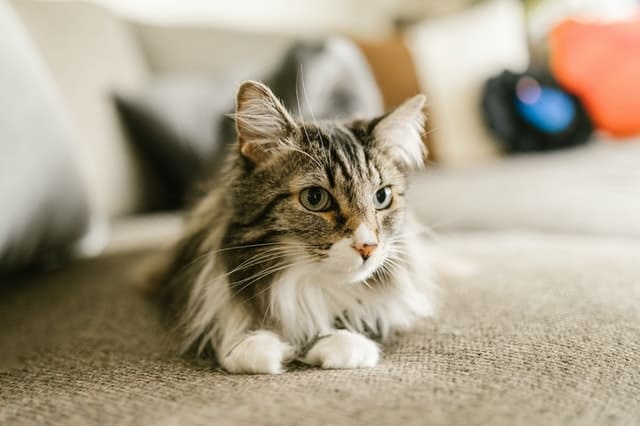
The cough in cats is a sign of several problems, although cough is a pre condition for disposal, discomfort in the trachea, larynx, throat, in order to free the airways.
Among some of the diseases that can cause coughing in cats, we have: bacterial and parasitic infections, viruses, allergies, asthma, etc.
It may also be simply wanting to eject a crossed hairball.
The most advisable thing is to take them to the vet and that through examinations, x-rays and samples, they are diagnosed and medicated, since if we do it and the cat has something chronic, when it is taken to the doctor it may be too late.That is why below we are going to learn about some of these causes of cough in cats and also what we should do to help our cat have a full and safe life.
Coughs in cats, different types
As it happens to humans, we already know that coughing is due to different causes and among them the following stand out:
- Viral : cats are often affected by viruses that affect the respiratory system and can present watery eyes, runny nose, fever and lack of appetite.
- Irritant effects : many times it can be due to allergies to strong odors such as tobacco and strong perfumes.
- Heart failure : in this case you have to be very vigilant, since the cough occurs continuously, without secretions, fever and no other symptoms, only the veterinarian can diagnose it.
- Strange elements : cats are generally curious, and many times they eat what they find, then when trying to return it, it causes them to cough.
- Tight collar: sometimes we put the collar on our cat and we do not notice if it is too tight, so we must test the space between the skin and the collar with our fingers, so that it does not have pressure and avoid a dry cough.
- Parasites and bacteria : Certain parasites that lodge in the lungs cause coughing and shortness of breath. Likewise, the bacteria also affect them, mostly in puppies, apart from presenting, it gives them fever, sneezing and eye discharge.
Cat with cough and snot
Sometimes a cat has a cough, sneeze, phlegm and mucus and it is likely an infection, bacterial or viral.
In any of the cases, it is best to consult with your trusted veterinarian, so that through tests, determine what it is and what is appropriate.
Cat with severe dry cough
The dry and constant cough in cats is very similar to that of a smoker, which is a problem with the bronchial tubes, due to temperature changes or air pollution, cats also get bronchitis.
Among the symptoms is a dry, harsh and constant cough, it should be taken to the vet for diagnosis and treatment.
Cat that coughs a lot and chokes
It is a cough that is a little more difficult to detect, because it manifests itself together with other pulmonary noises, which we do not perceive, which are very slight beeps.
This cat cough is accompanied by strange sounds that come out of the cat’s body and are usually very dramatic, it seems that they are choking or suffocating, because they cannot breathe.
In this case it is very likely that it is asthma. You have to go to the vet to evaluate it and determine the treatment.
Cat with a cough, vomiting
On this occasion we observed the cat with a cough and accompanied by attempts to vomit. This is a very particular cough because, in addition, the cat is accommodated in such a way that the neck stretches it almost horizontally and can even expel a ball of hair.
This is a very common act in our cats, since they spend much of their time grooming and swallowing hair, and it is normal that they end up swallowing hair.
The hairball can be returned with a little bile, it is normal for this to happen.
Cat coughing and listless
When a cat has a cough and it is accompanied by listlessness, weakness , poor appetite, and loses weight, be on the alert.
Parasites can be the main cause, causing our cat to have no energy, which is why they must be dewormed every time the veterinarian considers it and indicates it .
Another reason is fungi in cats , as they attack the immune system, weakening and making our cat sick.
Feline asthma
Cats, like humans, can also suffer from asthma. This is mainly due to environmental allergies (natural or from sources of pollution). It presents with a chronic cough in cats, which is increasing each time.
When coughing in cats occurs, it may accompany episodes of apnoea. The diagnosis is usually confirmed through a lung film and blood tests.
Depending on the degree of asthma, the use of inhalers may be recommended. When asthma is chronic, oxygen therapy , which is why we must be very aware of our cats when they have a cough.
Treatment of cough in cats
Before starting any treatment for your cat’s cough, you must first find out the cause of this cough.
The first thing we must do is observe our cat and the way it is coughing. How it does it, how often it coughs, if it is at certain times of the day, if it is after exercising or playing, where in the house it coughs more, if it does it while sleeping or resting.
After knowing all this, we must take it to the vet, where it will make us respond to everything we observe our cat. We have to describe the coughing episodes, how, when, where, etc.
In this way, you will make the decision together with the pertinent evaluation, to what type of exams you will submit our cat.
You will have a routine physical exam, take blood samples, take x-rays to visualize your lungs. With the biochemical profile, they can tell if there is bacterial or parasitic infection .
If you have allergies, where will you be ordered to do another type of analysis, to study the types of allergies.
It is very very important to give our kittens the prescribed dose, since they are very sensitive to medications, so here are some important suggestions to avoid allergies and give our kittens relief and quality of life:
- Don’t smoke and don’t let others do it in front of your cats. If you are a smoker, wash your hands if you are petting them.
- If you have a fireplace, make sure it has good smoke evacuation. Smoke is very harmful when there are lung problems.
- Try not to use sprays around your cat.
- Do not use scented candles, incense, or anything that emits strong odours, as they are a trigger for very sensitive cats.
- The sudden change in temperature also affect our cat.
- Change the litter in your cat’s box, use odourless litter and less dust.
- It is very important that they have a good anti-inflammatory diet, since there are foods that instead of helping worsen their health. Like corn, wheat, rice or millet, grains are highly inflammatory foods for the respiratory tract of cats. Avoid foods with a lot of grains.
- Always keep fresh and clean water for it.
- Brush your cat daily so it doesn’t swallow as much hair when licking.
- Don’t use bleach to wash your utensils and toys, just use water and vinegar.
I hope all this information will help you and if your cat coughs, and it is more common than it seems, remember, observe well when and how it happens, take it to the vet and never self-medicate it.






